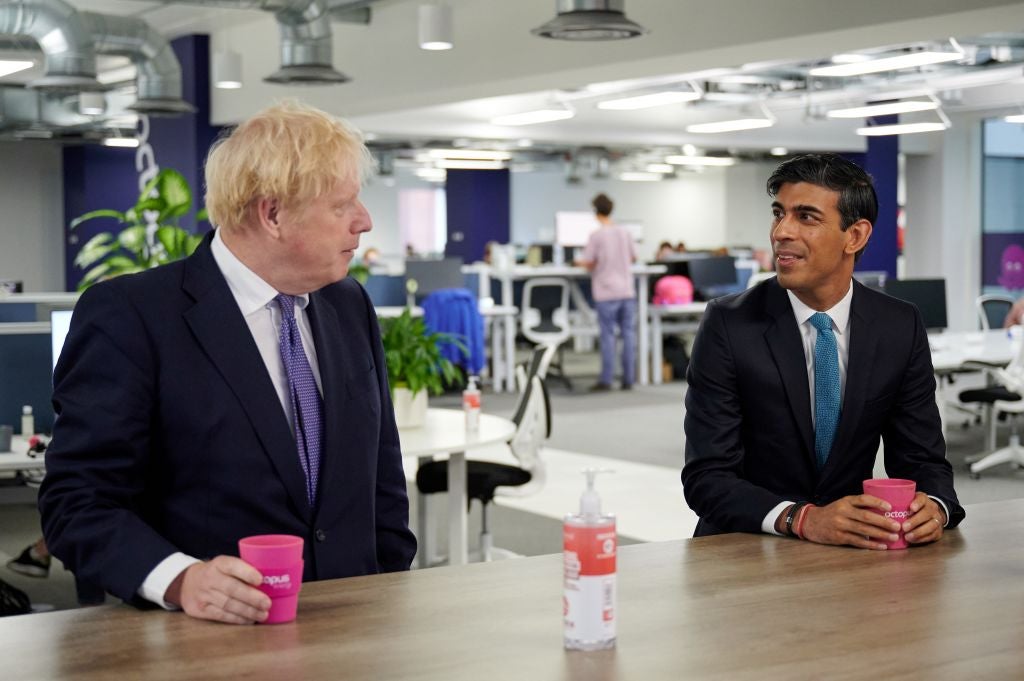The virtual conference did not resolve the Conservatives' identity crisis – Johnson and Sunak are in different camps
All roads lead to higher taxes. But who will pay? The prime minister and the chancellor seem to disagree


Your support helps us to tell the story
From reproductive rights to climate change to Big Tech, The Independent is on the ground when the story is developing. Whether it's investigating the financials of Elon Musk's pro-Trump PAC or producing our latest documentary, 'The A Word', which shines a light on the American women fighting for reproductive rights, we know how important it is to parse out the facts from the messaging.
At such a critical moment in US history, we need reporters on the ground. Your donation allows us to keep sending journalists to speak to both sides of the story.
The Independent is trusted by Americans across the entire political spectrum. And unlike many other quality news outlets, we choose not to lock Americans out of our reporting and analysis with paywalls. We believe quality journalism should be available to everyone, paid for by those who can afford it.
Your support makes all the difference.Fittingly, the Conservative Party’s virtual conference did not tell us much about the crucial decisions the government will have to take in the real world, or resolve the party’s identity crisis. Although they showered praise on each other, Boris Johnson and Rishi Sunak are in different camps – both on the further coronavirus restrictions now inevitable after the surge in infections, and the government’s fiscal strategy.
Despite rightly splashing the cash this year, the chancellor is a fiscal hawk who used his conference speech to warn of “hard choices” ahead. With austerity off limits, that is code for tax rises in the medium term. Sunak hinted at a Tory fringe meeting that the party manifesto’s fiscal targets will be impossible to hit. But allies say he wants to stick to the pledges not to raise the rates of income tax, national insurance and VAT. He has other options, such as stealth taxes, reducing tax relief on private pensions and hitting capital gains.
Sunak drew a dividing line with Labour and sent a clear message to his party: the Tories have a “sacred responsibility” to future generations to leave the public finances strong. If they argued they could simply borrow their way out of a hole, he asked, “what is the point in us?” In other words, if the Tories try to compete with a big spending Labour Party, voters will choose the real thing. It was a message many Tory MPs and activists wanted to hear; they think Johnson has become unconservative.
The prime minister told the conference he did not share Labour’s goal of a permanent big state, saying the state “must stand back and let the private sector get on with it”. He speaks the language of the free market to try to reassure his disenchanted MPs, but his actions speak louder. His team is sceptical of Treasury forecasts on the deficit – even though everyone agrees it will be well over £300bn in the current financial year and rising – and so is not yet convinced about the need for tax rises. Indeed, Johnson’s speech even nodded to right-wing Tories clamouring for tax cuts to spur growth, saying that UK tax and regulation needed to be “more competitive”. Of course Johnson would prefer popular tax cuts to painful rises but such a have-cake-and-eat approach doesn’t add up. It would rightly be seen as a gamble too far by Sunak.
In a sign of battles to come, and Johnson’s reluctance to take unpopular decisions, he has vetoed Sunak’s sensible proposal to suspend the triple lock on the state pension. The prime minister announced hastily cobbled-together promises to spend more – such as one-to-one tuition in schools and a hint of compulsory insurance to fund social care. But these were back of a cigarette packet policies. Unusually for a leader's party conference speech, his aides were unable to flesh out any detail or say how they would be funded.
Johnson acknowledged that levelling up the poorest regions will be even harder after the pandemic. But a few new bridges and roads will not be enough; voters in the “red wall” former Labour seats who went Tory last December want and deserve more investment in public services. Many of them already have more coronavirus restrictions than other regions due to higher infection rates, and are about to be hit harder by the next round of curbs. This will entrench the very north-south divide that Johnson has made his mission to tackle. Sunak must urgently find a way to help businesses in the areas hit by local lockdowns to save jobs.
He will want to make a start on saying how he will balance the nation's books in his Budget next March, even if any tax rises do not take effect immediately. By then, he and Johnson will have to resolve their party’s identity crisis.
All roads lead to higher taxes. But who will pay? The red wall voters fear they will, but that would be politically impossible. Ministers know these voters' living standards will have to rise by the next election in 2024. So the Tories will have to hit their traditional supporters in their deeper pockets.
Johnson will have to do a Tony Blair in reverse. Blair judged that his party’s working class voters had nowhere else to go and wooed the middle classes to win power.
Although Johnson will hate the unpopularity it brings, he will have to take the votes of the better off for granted in order to retain his working class support. There are no easy answers; while Blair’s strategy delivered him three terms in office, his party lost five million voters between 1997 and 2010, when it lost power.



Join our commenting forum
Join thought-provoking conversations, follow other Independent readers and see their replies
Comments